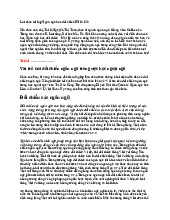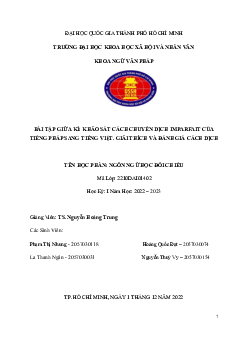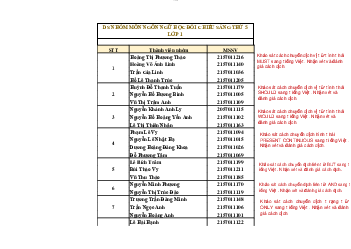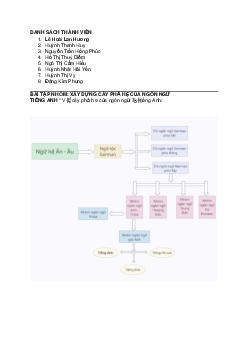







Preview text:
Tiếng Anh Tiếng Việt
1. Robert Jordan could walk well enough 1. Robert Jordan đi bộ không tệ và chàng
himself and he knew from following him biết rằng để bám sát theo gót lão già ngay
since before daylight that the old man
từ trước hừng đông, hẳn lão sẽ làm chàng
could walk him to death. (trang 4)
chết đi vì mệt. (trang 14)
2. They tell me you blow bridges very
2. Nghe đâu đồng chí phá cầu cừ lắm . well . (trang 5) (trang 18)
3. “Very little in my judgment. To steal,
3. Theo tôi thì ít khi lắm. Để ăn cắp,
yes. To eat well , yes. To murder, yes. To đúng. Để no đủ hơn , đúng. Để giết fight, no.” (Trang 10)
người, đúng. Để tranh đấu thì không. (Trang 28)
4. Not a thinker. Man, I’m hungry, he
4. Mày không là một nhà tư tưởng. Chàng
thought. I hope Pablo eats well . (trang 11) nghĩ, mày đang đói đó chú nhỏ. Miễn sao được ăn ngon
ở nhà Pablo là được rồi. (trang 30) 5. It was as well
hidden as a bear’s den. 5. Nó được
giấu kín như cái hang gấu. (trang 11) (trang 31) 6. He knew the details very
well and he 6. Chàng thừa biết chuyện xảy ra cách
knew they would not make good talking
nào, và chàng đồng thời cảm thấy đề tài now. (trang 13)
câu chuyện này hẳn không thích hợp ở đây. (trang 35) 7. It was well
cooked, the rabbit meat 7. Thức ăn được nấu kỹ, thịt chín rục rời
flaked off the bones, and the sauce was
hẳn khỏi xương, và nước sốt ngon tuyệt. delicious. (trang 14) (trang 37)
8. I take the place of the other blond one. 8. Tôi thay chỗ cho người đàn ông tóc
Also I know this country from before the vàng kia. Lại nữa, tôi đã từng biết vùng movement.
này trước khi phong trào được phát động.
You know it well ? (Trang 14)
Anh biết rõ nơi này không ? (trang 38)
9. No, not really well
. But I learn fast. I 9. Không rõ lắm , nhưng tôi học rất
have a good map and I have a good guide. nhanh. Tôi có một tấm bản đồ và một (trang 14)
người hướng dẫn giỏi. (trang 39)
10. He was violating the second rule of
10. Chàng đang vi phạm quy luật thứ hai the two rules for getting on
well with trong hai quy luật mà người ta cần phải áp
people that speak Spanish (trang 14)
dụng nếu muốn hòa hợp với người Tây Ban Nha (trang 39)
11. She looked at him and laughed, then
11. Nàng nhìn chàng và phá lên cười, slapped him on the knee.
đoạn vỗ vào đầu gối chàng:
“Of Pablo? You have seen Pablo?”
Vợ của Pablo à? Cô đã gặp Pablo chưa? “ Well
, then, of Rafael. I have seen Vậy thì của Rafael. Tôi đã gặp Rafael rồi. Rafael.” (trang 15) (trang 39)
12. “Of no one,” the gypsy said. “This is a 12. Không của ai hết - Tên du mục nói -
very strange woman. Is of no one. But she Đó là một người con gái kỳ lạ. Nàng
cooks well. ” (trang 15)
không thuộc một người nào. Nhưng lại
khéo nghề nấu nướng. (trang 39)
13. In the cave. The girl can cook a little. 13. Trong hang. Cô bé biết nấu nướng
I said she cooks well to please her. (trang chút đỉnh. Tôi bảo cô ta nấu nướng khéo lOMoAR cPSD| 41487147 15)
là để làm vừa lòng cô ta đấy thôi. (trang 41) 14. The dusk was coming
well on then 14. Đến chiều và với bóng đêm phủ
and when the night came it was all right. xuống, mọi sự diễn ra tốt đẹp . Nhưng
But it was lucky that they had no cavalry. cũng may là chúng không có kỵ binh. (trang 17) (trang 45)
15. There they will treat her well and she 15. Ở đó người ta sẽ săn sóc nàng rất chu
can work with children. (trang 19)
đáo , và nàng có thể trông trẻ em. (trang 50)
16. He comes every night. He is a
16. Ông ta đến đây mỗi tối. Người láng neighbor. Also a friend as
well as a giềng mà, ông ta vừa là bạn vừa là đồng comrade. (trang 20) chí. (trang 52)
17. The road, which was broad and oiled 17. Con đường rộng, tráng nhựa, thực
and well constructed, made a turn to the hiện công phu , rẽ sang phía trái ở đầu
left at the far end of the bridge and then
cầu bên kia mất hút trong một khúc quanh
swung out of sight around a curve to the
chạy về phía tay phải. (trang 56) right. (trang 21)
18. Anselmo flattened on the ground and 18. Anselmo nằm sát xuống mặt đất,
Robert Jordan slipped his glasses into his Robert Jordan cho ống dom vào túi áo và
shirt pocket and put his head well behind lách sau thân cây thông. (trang 56) the pine tree. (trang 22)
19. He started up the hill, moving
19. Chàng bắt đầu leo ngược dốc, chàng
carefully and taking advantage of the
bước dè dặt dưới những cành lá che phủ,
cover until they were out of sight.
Anselmo theo sau chàng khoảng một trăm
Anselmo followed him at a hundred yards thước, khi đã chắc chắn rằng họ đã đi distance. When they were
well out of khuất khỏi chiếc cầu. Lão già đã theo kịp
sight of the bridge, he stopped and the old chàng và bước lên phía trước đi đều bước
man came up and went into the lead and
tới gần đèo, và trong bóng tối lão đang
climbed steadily through the pass, up the leo lên một cái dốc đứng. (trang 58)
steep slope in the dark. (trang 22)
20. They shot much and well and we were 20. Chúng bắn nhiều và bắn giỏi , và bọn
like sheep before them. (trang 24)
này chẳng khác gì những con trừu trước mặt chúng (trang 63)
21. “For us will be the bridge and the
21. Về phần ta, cây cầu và trận đánh, nếu
battle, should there be one,” Robert
trận đánh xảy ra. - Robert Jordan nói và
Jordan said and saying it in the dark, he
khi thốt lên những lời này trong bóng tối,
felt a little theatrical but it sounded
well chàng cảm thấy mình hơi cải lương một in Spanish. (trang 25)
chút, nhưng nói bằng tiếng Tây Ban Nha
thì nghe nó kêu lắm . (trang 64)
22. “That we blow up an obscene bridge 22. Người ta sắp giựt tung cây cầu chó đẻ
and then have to obscenely well obscenity và phải chuồn khỏi vùng này phải
ourselves off out of these mountains?” không ? (trang 67) (trang 26) 23. As well
the bridge as another thing. 23. Cây cầu hay cái gì khác. (trang 67) (trang 26)
24. But I would say one thing. Guard well 24. Nhưng tôi muốn nói với đồng chí một lOMoAR cPSD| 41487147 thy explosive. (trang 26)
điều, đồng chí hãy giữ kỹ những cốt mìn
của đồng chí. (trang 68)
25. “Care well for thy unprintable 25. Đồng chí hãy coi chừng những cốt explosive.” (trang 26)
mìn chó đẻ của đồng chí. (trang 68)
26. “You know him well ?” (trang 27)
26. Đồng chí biết rõ hắn hả ? (trang 68)
27. “Are they not well outside?” Pablo 27. Không để nó bên ngoài được à ? - asked. (trang 28) Pablo nói. (trang 71)
28. “After the bridge,” he said again
28. Sau vụ cây cầu. - Chàng lặp lại thật
deliberately and took a sip of the absinthe. chậm, và chàng uống một ngụm rượu I might as well
bring it on, he thought. ngải. Tốt hơn nên nói toạc ra, chàng
It’s coming anyway. (trang 29)
nghĩ. Dù sao điều đó phải đến. (trang 75)
29. Robert Jordan watched Pablo and as
29. Robert Jordan quan sát Pablo và trong
he watched, letting his right hand hang
khi quan sát hắn, chàng hạ bàn tay phải
lower and lower, ready if it should be
mỗi lúc một thấp hơn, trong tư thế sẵn
necessary, half hoping it would be
sàng nếu thấy cần thiết, chàng hy vọng
(feeling perhaps that were the simplest
một phần câu chuyện sẽ xảy ra như thế.
and easiest yet not wishing to spoil what
Có thể chàng cảm thấy việc đó dễ dàng và
had gone so well , knowing how quickly đơn giản hơn cả, đồng thời chàng cũng
all of a family, all of a clan, all of a band,
không muốn làm hư công việc đang tiếp
can turn against a stranger in a quarrel,
diễn tốt đẹp , chàng thừa biết cả một gia
yet thinking what could be done with the
đình, cả một phe nhóm, cả một đảng có
hand were the simplest and best and
thể tức thì quay ra chống lại kẻ lạ mặt
surgically the most sound now that this
trong một cuộc tranh luận, tuy nhiên,
had happened), saw also the wife of Pablo chàng cũng nghĩ rằng việc tự tay chàng
standing there and watched her blush
thực hiện được sẽ là điều giản dị nhất, tốt
proudly and soundly and healthily as the
đẹp nhất và đúng theo phẫu thuật thì đó là
allegiances were given. (trang 30)
điều lành mạnh nhất, chàng nghĩ thế, bây
giờ khi cơ sự xảy ra; chàng cũng thấy vợ
Pablo đứng đó, và chàng nhìn bà ta đỏ
mặt lên một cách tự phụ và lành mạnh
trước những biểu lộ về sự đồng tình kia. (trang 76)
30.I killed him very well , you understand. 30. Tôi đã
giết nó chết, mụ biết chớ. (trang 31) (trang 78)
31. “No. Listen. Take the wax from thy
31. Không. Nghe đây. Hãy cạy bỏ cái hairy ears. Listen
well . I command.” chất ráy trong hai cái lỗ tai lông lá của (trang 32) ông đi. Hãy
nghe kỹ đây. Tôi, chính tôi chỉ huy. (trang 80)
32. That you should command and that
32. Bà cứ chỉ huy cho bằng thích. Và bây
you should like it. Now if you are a
giờ, nếu bà vừa là một người đàn bà vừa woman as well
as a commander, that we là một lãnh tụ, thì hãy cho chúng tôi ăn đi.
should have something to eat. (trang 32) (trang 80) 33. “ Well
, did you see the bridge?” the 33. Vậy thì đồng chí đã trông thấy cây
gypsy asked. The others, who had not
cầu rồi chớ? - Tên du mục hỏi. Những
opened their mouths after the change of
người khác không ai hé môi từ khi câu
allegiance, were all leaning forward to
chuyện dịu lại, giờ đây đang nghiêng lOMoARcPSD|414 871 47 listen now. (trang 32)
người lắng nghe. (trang 81) Chương 1. TỔNG QUAN
1. Ngôn ngữ học đối chiếu: Ngôn ngữ học đối chiếu (Contrastive Linguistics) là
một phân ngành ngôn ngữ học nghiên cứu so sánh hai hay nhiều hơn hai ngôn
ngữ bất kì để xác định những điểm giống nhau và khác nhau giữa các ngôn ngữ
đó, không tỉnh đến vấn để các ngôn ngữ được so sánh có quan hệ dòng họ hay
thuộc cùng một loại hình hay không.
2. Với những kiến thức đã học được trong chuyên đề nghiên cứu ngôn ngữ học đối
chiếu, nhóm chúng tôi tiến hành khảo sát cách chuyển dịch từ “well” trong tiếng
Anh sang tiếng Việt. Để thực hiện đề tài này, chúng tôi khai thác nguồn ngữ liệu
qua tập truyện “Chuông gọi hồn ai” của tác giả Ernest Hemingway. So sánh
cách thức chuyển dịch từ bản tiếng Anh “For whom the bell toll” là tiểu thuyết
được xuất bản năm 1940 của nhà văn Mỹ Ernest Miller Hemingway. Với bản
tiếng Việt “Chuông gọi hồn ai” Huỳnh Phan Anh dịch.
3. Chúng tôi tiếp cận đề tài bằng các phương pháp tìm kiếm, phân tích, tổng hợp
và đối chiếu các ngữ liệu tìm được. Nhằm tăng tính khoa học và mức độ chuẩn
xác, chúng tôi xem xét và chọn lọc những tài liệu tham khảo phù hợp với đề tài
và phạm vi nghiên cứu đối chiếu. Cụ thể, chúng tôi tham khảo các khái niệm trạng từ , trạng từ “well” trong English Grammar
(https://www.englishgrammar.org) và các chức năng của trạng từ “well” qua
các trang từ điển uy tin như Collins Cobuild, Cambridge, Oxford Learner's,
Longman Dictionary of Contemporary English..
CHƯƠNG 2. ĐỊNH NGHĨA VÀ CÁC NHÓM CHỨC NĂNG CỦA TRẠNG TỪ WELL
2.1. Định nghĩa trạng từ và khái quát trạng từ well trong tiếng Anh
2.1.1. Định nghĩa trạng từ
Adverbs are one of the four major word classes, along with nouns, verbs and adjectives.
We use adverbs to add more information about a verb, an adjective, another adverb, a
clause or a whole sentence and, less commonly, about a noun phrase. …
Adverbs have many different meanings and functions. They are especially important
for indicating the time, manner, place, degree and frequency of something. …
Adverbs have a strong connection with adjectives. Adjectives and adverbs are usually
based on the same word. Adverbs often have the form of an adjective + -ly. … lOMoAR cPSD| 41487147
2.1.1.1. Các loại trạng từ
Time adverbs (Trạng từ chỉ thời gian)
Time adverbs tell us about when something happens: already, lately, still, tomorrow,
early, now, soon, yesterday, finally, recently, today, yet. Example: Have you seen John today? I’d prefer to leave early. I bought a new TV yesterday.
Place adverbs (Trạng từ chỉ nơi chốn)
Place adverbs tell us about where something happens or where something is: here,
there, everywhere, somewhere, anywhere, nowhere, nearby, inside, outside, away. Example: Is that your scarf there? He left me and go far away.
Anywhere in this town you can buy delicious caked. Manner adverbs
Manner adverbs tell us about the way something happens or is done. Manner adverbs are
often formed from adjectives by adding –ly: accurately, beautifully, expertly,
professionally, anxiously, carefully, greedily, quickly, badly, cautiously, loudly, quietly. Example: She sings beautifully He runs quickly.
She spoke very loudly. We could all hear what she was saying. Degree adverbs
Degree adverbs express degrees of qualities, properties, states, conditions and relations:
absolutely, enough, perfectly, somewhat, a (little) bit, entirely, pretty, terribly, a lot, lOMoAR cPSD| 41487147
extremely, quite, too, almost, fairly, rather, totally, awfully, highly, remarkably, utterly,
completely, lots, slightly, very, well,… Example:
It all happened pretty quickly.
The building was completely destroyed after the
earthquake The new car is too expensive. I can’t buy it. Evaluative adverbs
We put some adverbs outside the clause. They modify the whole sentence or utterance:
absolutely, definitely, apparently, clearly, honestly, fortunately, unfortunately, frankly,
bravely, carelessly, hopefully, carefully,… Example:
The homework is completed carefully.
Fortunately, they escaped from the fire.
Linking adverbs (then, however)
Linking adverbs show a relationship between two clauses or sentences (a sequence in
time, cause and effect, contrast between two things): besides, moreover, however,
indeed, meanwhile, consequently, furthermore, otherwise, therefore, likewise, thus,
additionally, comparatively, finally, next, hence, accordingly, however,… Example:
The government went through the decision of destroying historic buildings.
Consequently, there aren’t any places of interest here.
I left my house in the morning then I went to pick up Leanne at her house.
The sun will be shining in France. However, heavy rain is expected in Spain.
2.1.1.2. Comparative and superlative forms (Hình thức so sánh hơn và so sánh nhất)
Adverbs do not normally change in form, but a few have comparative and
superlative forms. These are usually short adverbs and so they normally have
comparative and superlative forms with -er and -est. Some of the most common
comparative and superlative adverbs are: soon sooner soonest fast faster fastest lOMoAR cPSD| 41487147 hard harder hardest near nearer nearest early earlier earliest
far farther/further farthest/furthest late later latest Example:
Teachers always say that students must work harder.
The kids were playing in the garden, seeing who could jump highest.
Adverbs with more and most: Adverbs with two or more syllables form the
comparative and superlative with more and most Example:
We need to treat the environment more carefully.
It was the most beautifully designed chair.
Comparative adverbs (using than): When we mention the second person or thing
in the comparison, we use than. We do not use that or as. If the second person
mentioned takes the form of a personal pronoun, we normally use the object
form of the pronoun (me, you, him, her, us, them) Example:
I can’t keep up with him – he runs much faster than me. Well and badly
The adverb well has the same comparative and superlative forms as the adjective good
(better, best). The adverb badly has the comparative and superlative forms worse, worst.
I played better yesterday but I need to improve my serve.
A lot of people behaved badly at the party, but she behaved worst of all.
2.1.2. Khái quát trạng từ well trong tiếng Anh
Như đã khái quát về trạng từ ở mục 2.1.1, well thuộc nhóm trạng từ chỉ mức độ.
If you do something well, you do it to a high standard or to a great extent. (Tạm dịch:
Nếu bạn làm tốt một điều gì đó, bạn sẽ đặt tiêu chuẩn hoặc mức độ cao hơn nữa) Ví dụ:
All the Indian batsmen played well. (Tất cả các tay vợt Ấn Độ đều chơi tốt) lOMoAR cPSD| 41487147
If you do something well, you do it thoroughly and completely. Ví dụ: Mix all the
ingredients well. Nếu bạn làm tốt điều gì đó, bạn sẽ làm điều đó một cách triệt để và
hoàn toàn. Ví dụ: Trộn đều tất cả các thành phần.
If you speak or think well of someone, you say or think favourable things about them.
Ví dụ: “He speaks well of you.” – “I'm glad to hear that.” Nếu bạn nói hoặc nghĩ tốt về
ai đó, bạn nói hoặc nghĩ những điều có lợi về họ. Ví dụ: 'Anh ấy nói tốt về bạn.' —'Tôi
rất vui khi nghe điều đó.'
Well is used to ask or talk about the extent or standard of something. Ví dụ: How well
do you remember your mother, Franzi? Bạn sử dụng tốt để hỏi hoặc nói về mức độ
hoặc tiêu chuẩn của một cái gì đó. Ví dụ: Bạn nhớ mẹ bạn như thế nào, Franzi?
Well is used in front of a prepositional phrase to emphasize it. For example, if you say
that one thing happened well before another, you mean that it happened a long time
before it. Ví dụ: Franklin did not turn up until well after midnight. Bạn sử dụng tốt
trước một cụm giới từ để nhấn mạnh nó. Ví dụ, nếu bạn nói rằng một điều đã xảy ra tốt
trước một điều khác, bạn có nghĩa là nó đã xảy ra một thời gian dài trước đó. Ví dụ:
Franklin đã không xuất hiện cho đến sau nửa đêm.
Well is used before certain adjectives to emphasize them. Ví dụ: She has a close group
of friends who are very well aware of what she has suffered. Bạn sử dụng tốt trước một
số tính từ nhất định để nhấn mạnh chúng. Ví dụ: Cô ấy có một nhóm bạn thân rất ý thức
về những gì cô ấy đã phải chịu đựng.
Well is used before adjectives referring to feelings to emphasize that the feeling is very
strong. Ví dụ: I was well happy with my goal. Một số người sử dụng tốt trước khi tính
từ đề cập đến cảm xúc để nhấn mạnh rằng cảm giác rất mạnh mẽ. Ví dụ: Tôi rất hài
lòng với mục tiêu của mình.
Well is used after adverbs such as 'perfectly', ' jolly', or 'damn' in order to emphasize an
opinion or the truth of what you are saying. Ví dụ: You know perfectly well I can't be
blamed for the failure of that mission. Bạn sử dụng tốt các trạng từ như 'hoàn hảo', 'vui
vẻ' hoặc 'chết tiệt' để nhấn mạnh ý kiến hoặc sự thật về những gì bạn đang nói. Ví dụ:
Bạn biết rất rõ tôi không thể đổ lỗi cho sự thất bại của nhiệm vụ đó.
Well is used after verbs such as 'may' and 'could' when you are saying what you think is
likely to happen. Ví dụ: The murderer may well come from the estate. Bạn sử dụng tốt
sau các động từ như 'có thể' và 'có thể' khi bạn đang nói những gì bạn nghĩ có khả năng
xảy ra. Ví dụ: Kẻ giết người cũng có thể đến từ bất động sản.
2.2. Các nhóm chức năng của trạng từ well
Ngôn ngữ học đối chiếu - Ngôn ngữ học đối chiếu
Ngôn ngữ học Đối chiếu (Đại học Khoa học Xã hội và Nhân văn, Đại học
Quốc gia Thành phố Hồ Chí Minh)



